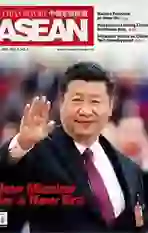Dancing Together
2018-05-14ZhangHongrui
Zhang Hongrui
The 2018 International Munao Zongge Festival kicked off on February 27 in Ruili, southwest Chinas Yunnan Province, attracting tens of thousands of tourists. While “Munao” derives from Jingpo language, “Zongge” is a transliteration from Zaiwa language. Put together, the words mean “dancing en masse.” Dubbed “Dance of Paradise,” the festival was inscribed on Chinas first National Intangible Cultural Heritage List.
Diverse Carnival
Located in western Yunnan, Ruili is adjacent to the Myanmar border town of Muse. This close connection has promoted intense economic and cultural exchange between the two countries. The Munao Zongge Festival has become a holiday jointly celebrated by border residents on both sides. This years event attracted the participation of numerous Myanmar citizens.
On February 27, participants of the annual carnival both men and women, old and young, flooded in from all directions. Accompanied by horns and trumpets, members of various ethnic groups including Dai, Achang, Deang, Blang and Han donned festive costumes and gathered in Munao Square, the venue for the pageant.
An upbeat, festive atmosphere consumed recently-renovated Munao Square, which was beautifully decorated and filled to the brim with cheering crowds. The male performers wore white shirts, black trousers and scarves of various colors with hanging red tassels and wielded glittering broadswords. With handkerchiefs and decorative fans in hand, and led by a shaman, the women shifted into various formations as they sang and danced to the rhythm of the music.
As the dancing teams jostled back-and-forth, they resembled a flock of birds hovering over the square if viewed from afar. As the festive atmosphere escalated, spontaneous cheers and applause periodically burst from the crowd. Ms. Chen, who traveled from another Yunnan city just for the festival, found herself completely overwhelmed by the spectacle. “I love this holiday so much because it gives us ethnic minorities an opportunity to meet and dance together,” she exclaimed. “If I have time, I will come again next year.”
Immortal Folk Culture
Originating from an ancient grand sacrificial ritual honoring the sun-god worshipped by the Jingpo ethnic group, the Munao Zongge Festival radiates legendary charm. Throughout the centuries, it has been handed down as a cultural gem. The legend that inspired it helps the Jingpo people feel a strong connection with nature. After attending the momentous “Dance of Heaven” event, they become more united and confident.
After evolving alongside the development of the Jingpo people throughout history, the Munao Zongge Festival has become iconic of the Jingpo people in diverse modern society. Whenever the festival is mentioned, people cant help but think about Jingpo culture. The folk festival should be considered a living ethnic cultural dictionary that consolidates ethnic identity, promotes ethnic culture and integrates traditional culture into modern civilization.
“Activities like this are very meaningful,” opined Ruili citizen Tang Mukun. “They showcase the unique diversity of the cultures of our province. Due to social development, young people today know less and less about our traditional folk customs. I hope such events will continue so that traditional etiquette and customs can be treasured, preserved and passed down from generation to generation.”
